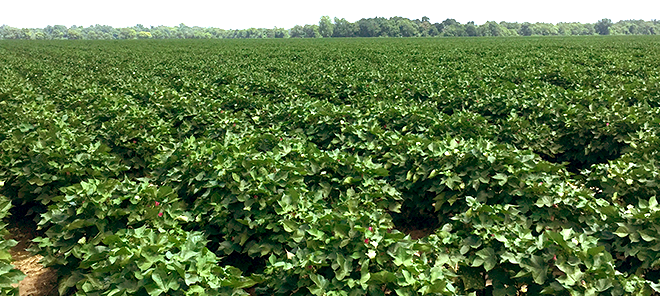
Weed-Free Fields Help Cotton, Soybeans Excel
Jack Kent estimates it’s been about six weeks since the last significant rainfall on his fields of Enlist E3® soybeans and PhytoGen® cotton with the Enlist® trait. To help out the crops, he’s turned on the irrigation system.
“The cotton looks beautiful,” Kent says. “These new PhytoGen varieties are amazing. This year, we’re headed toward another successful cotton yield.”
For Kent, pigweed is a perennial challenge. But he aims to reduce the glyphosate-resistant population over time with a program approach to weed control that includes multiple herbicide modes of action.
“Pigweed will never disappear. The wind, birds, etc., spread the seed,” Kent says. “We scout our fields and use Enlist™ herbicides in a program approach to keep weeds out of our fields.”
This year, Kent started his weed management program for Enlist® cotton with an application of Enlist One® herbicide tank-mixed with metolachlor to take care of any weeds at planting.
“We started out perfectly clean,” Kent says. He followed with a postemergence application of Enlist Duo® herbicide and then an application of Enlist One tank-mixed with glufosinate. For his Enlist E3 soybeans, Kent applied a preemergent herbicide followed by postemergence applications of Enlist Duo herbicide, then Enlist One herbicide plus glufosinate and then glufosinate alone.
The glufosinate tolerance is important to Kent because it adds another mode of action to his weed management program and enhances weed control in his fields.
With conventional soybeans across the road from his Enlist cotton, Kent’s herbicides needed to stay right on target. He diligently followed the label, adhering to wind restrictions and all other label requirements. Kent reports the applications went well, and the Enlist herbicides stayed where they were sprayed.
Next, he plans to apply Transform® insecticide to control plant bugs in his cotton, water the crops and that’s about it, he says.
“It is really a beautiful cotton crop. The crop is fruiting and retaining most of the fruit,” he says. “My wife jokes with me and tells me I have two really good days each year: The day we plant and the day we harvest. I’m looking forward to harvest.”

